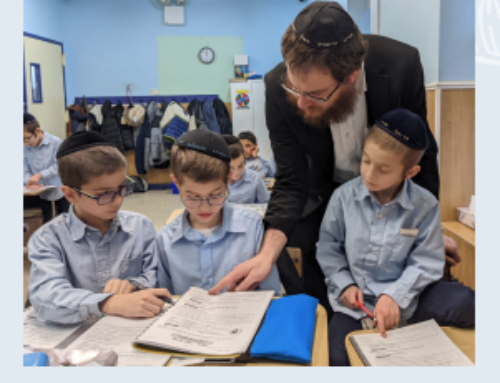By: Yonit Tanenbaum
The influence of a secular educational model on the “school culture” of Jewish learning:
On Friday, November 25, 2011, the Menachem Education Foundation (MEF)—an organization dedicated to facilitating elevated learning opportunities in the Jewish world—hosted Norman Atkins, Co-Founder and President of Relay Graduate School of Education and Founder of Uncommon Schools, in Crown Heights, Brooklyn. Educators from many local Hasidic schools, as well as a handful from out of the state, gathered to see what they could learn from Mr. Atkins’ two decades of experience in urban education.
There are currently 20,000 students in the Northeastern United States benefitting from the innovative charter schools and classrooms that have been founded or influenced by Mr. Atkins’ work. That is about the same amount of students currently in the Chabad-Lubavitch educational system today—a system that Mr. Atkins said he feels faces so many of the same challenges as other Jewish and secular schools. How wonderful it would be to take the very same techniques that have been implemented successfully in those charter schools and implement them in our Jewish schools, thereby providing the same level of learning and culture experiencing.
MEF was founded with the goal of raising the bar on Jewish education in Orthodox communities. Mr. Atkins said he believes that building a strong school culture in the Jewish community is achievable and that the Lubavitch school system might even have a leg up on other schools given strong sense of shared values, meaningful rituals, and focus on preparing world emissaries.
The Master’s degree program that Mr. Atkins founded for teachers in 2008 is unique in its approach and application; the teachers and professors collaborate on teaching techniques gleaned from a variety of studies, and evaluate one another based on video clips of themselves teaching. Mr. Atkins shared his findings with the educational leaders who attended the seminar, highlighting the ways in which the Orthodox Jewish educational system is on the right track and the elements that can be implemented for stronger student learning.
To Mr. Atkins, the Orthodox Jewish community already has a strong educational infrastructure that can benefit from this learning model. Putting in the time to assist Lubavitch schools is something that Mr. Atkins said he is happy to do because he and so many people he knows have benefited from the global network of the Chabad-Lubavitch network. “When [the Lubavitch community and MEF] come knocking at my door,” he added, “I have to open mine to them as well.”
Mr. Atkins underscored the importance of the values taught in school. The culture created in the classroom is so central to students’ overall learning experiences. There is so much responsibility on the shoulders of educators, in their roles as leaders, to shape the lives of students so that they can go out and lead the lives we want them to lead. The tools are at our fingertips; they’re in the collective work of educators sorting through the issues they find in their schools and in the educators sharing their wins.
Exemplary learning can be drawn from one of the most well-known mashpiim (spiritual mentors) in Chabad, Reb Mendel Futerfas. Reb Mendel, as Mr. Atkins relayed, had a unique way of continuing his learning while exiled in Siberia. In his memoirs, Reb Mendel writes about how he was able to learn, even without his texts, by envisioning the cheder (traditional Jewish elementary school) in which he learned as a youngster and the manner in which his rebbe (schoolteacher) taught the boys. This is re-experiential learning at its best.
Children pick up on things adults might not often take into account. It is therefore of utmost importance, stressed Mr. Atkins, that teachers focus not only on what is taught but also on how it is taught and who they are as human beings and as educators. How a teacher sets up the classroom, looks, feels, smiles, and interacts with the students will be decisive in his or her student’s memories. Those memories directly influence what the child learns and how the child relates to his or her tradition.
Reb Mendel Futerfas, in his flashback to the cheder he grew up in and the rebbe who taught him, remembered his teacher’s kind, patient demeanor and love. Mr. Atkins suggested that this is the goal we should aim for—positive memories for students to come back to when they recall their learning experiences.
Setting big goals along with specific goals along the way will help us to achieve ultimate learning for Jewish students. Every child is capable of learning on an elevated level. And character is malleable. Every person is born with certain dispositions, personality, and general makeup, but each one of us, emphasized Mr. Atkins, has the capacity to change and develop.
The following eight character traits, according to research conducted by Christopher Peterson and Martin Seligman, are seen as the most vital for a happy and successful life and, said Mr. Atkins, should be incorporated as much as possible into educational systems:
- Zest. Excitement for life is the number one component for a happy existence. A teacher must have charisma in the classroom for students to appreciate what they are being taught. The joy factor experienced on joyous occasions should be felt throughout a child’s learning career. An example of the application of zest in the classroom is shaking each student’s hand as he or she enters the classroom. When a child is greeted individually, he or she will feel excited to learn.
- Grit. Persistence and endurance are vital to a person’s success in this world. This can be promoted in the classroom by encouraging good sportsmanship.
- Humor. Laughter and good humor has been proven time and again to play a huge role in creating excitement for learning. Creating a positive atmosphere in the classroom will encourage good behavior and instigate the student’s desire to stay on top of his or her game.
- Loving-kindness. Students can tell when their teacher likes them or not. The teacher must be a loving, kind individual; one who loves all people, his students in particular. It is critical for administrators to hire kind instructors.
- Hope. Always having good outcomes in mind will foster good behavior and the student’s eagerness to succeed. This can be implemented in the classroom by introducing ideas of a better future and by providing positive reinforcement.
- Self-Control. This is already stressed in the Jewish community and can be practiced in the classroom by the teacher calling attention to a student who refrains from responding to another student’s mean comment.
- Social Intelligence. This means understanding oneself and one’s role in society. Someone with social intelligence knows that people are different and yet they can live harmoniously. Social intelligence can be introduced into the classroom through the student’s learning about each other and about other communities.
- Gratitude. Being grateful for the little things people do makes them feel important and necessary to society. Teachers can show appreciation to students for little things such as coming to class or fulfilling a request.
Following the presentation, Dr. Charlotte Frank, Senior Vice President, Research and Development for McGraw-Hill Education, said that the success in good education “depends on how much we care that our students be proud learners, participants in our community, and uphold the dreams and aspirations of the Torah.”
Many things are being done effectively in the Orthodox Jewish school system. “Taking these lectures,” said Dr. Frank, is one of them. To ultimately succeed, she added, is to “take well-researched methods and use that knowledge to improve the quality of life in Jewish schools.”


